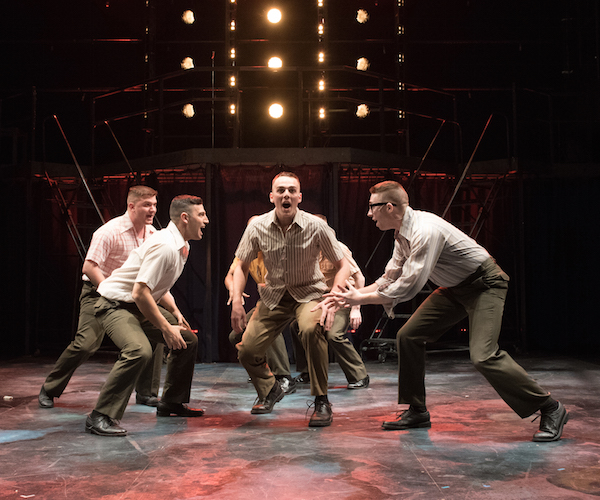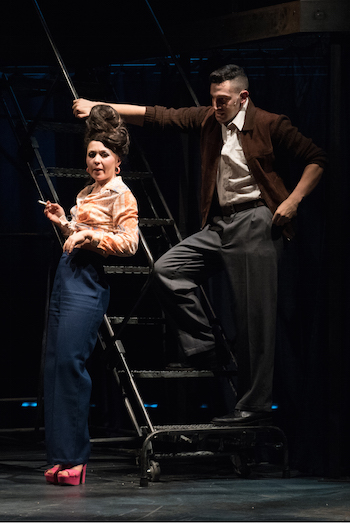Theater Review: SpeakEasy Stage Company’s “Dogfight” — Kudos All Around
Director Paul Daigneault and SpeakEasy Stage have a hit on their hands — a thoroughly enjoyable, moving production that has something powerful to say.
Dogfight, music and lyrics by Benj Pasek and Justin Paul, book by Peter Duchan, based on the Warner Bros. film and screenplay by Bob Comfort. Directed by Paul Daigneault, music direction by José Delgado, choreography by Larry Sousa. Staged by SpeakEasy Stage Company at the Stanford Calderwood Pavilion, Boston Center for the Arts, 527 Tremont Street, Boston, MA, through June 4.

Jordan J Ford (center) and members of the cast in the SpeakEasy Stage Company production of “Dogfight.” Photo: Glenn Perry.
By Evelyn Rosenthal
Dogfight, the 2012 Pasek and Paul musical based on the excellent 1991 film starring River Phoenix and Lili Taylor, deploys a full arsenal of charm, humor, and terrific music to tell its poignant tale of young people and a nation losing their innocence.
The show maps the road to disillusion, starting with shell-shocked Marine Eddie Birdlace riding a bus to San Francisco in 1967. Just back from Vietnam, he can barely speak to a friendly passenger who tries to draw him out. As he haltingly explains the three-bumblebee tattoo on his arm—signifying the B’s of his name and of his best buds Bernstein and Boland — the flashback to the single day of the show’s main action begins.
On the eve—literally—of the JFK assassination (November 21, 1963), a platoon of fresh recruits, in San Francisco for a night before leaving for Vietnam, is planning a “dogfight”—a party where whoever brings the least attractive date wins a pot of money. The cynicism and casual cruelty of this Marine tradition is lost on the soldiers, whose “Mad Men”–era view of women and macho ethos are as ingrained as their sincere patriotism and loyalty to one another. Still, these callow would-be heroes manage to seduce their unwitting dates with sweet-talking bravado, and the audience with their exciting ensemble work. In one ingeniously choreographed number, they heft and move chairs to transform the set from a bus to a locker room and then change their clothes, all while singing the rousing “Some Kinda Time,” to rev themselves up for one last blowout before shipping out.
The casting for this production is particularly effective. Director Paul Daigneault, on the faculty of Boston Conservatory, often mines the school’s superb young talent. For this show, his choice of current students and recent graduates of the Conservatory and other area theatre programs adds resonance, underscoring the show’s theme of young people facing the clash between their ideals and the way the world works.
Recent Conservatory grad Jordan J. Ford brings depth and intensity to the role of Eddie Birdlace, caught between the gung-ho Corps mentality of his buddies and newfound feelings stirred by his encounter with Rose Fenny, the awkward, sensitive diner waitress and aspiring folksinger he invites to the dogfight. In her first professional role, Alejandra M. Parrilla gives a lovely performance. She convincingly plays Rose’s ingenuous reverence for folk music icons like Woody Guthrie and Odetta, her over-the-moon thrill at being asked out on her first-ever date, and her anger and insistence on respect when she discovers Eddie’s original motive. Both leads sing beautifully, especially in the more reflective, tender numbers.

McCaela Donovan and Jared Trolio in the SpeakEasy Stage Company production of “Dogfight.” Photo: Glenn Perry.
And then there are the Boston theatre veterans, like McCaela Donovan and Patrick Varner. Donovan, who just won an IRNE award for her role as the lusty maid Petra in Huntington Theatre’s A Little Night Music, is hilarious and touching as Marcy, the brassy prostitute Boland hires to win the dogfight by going without her dentures, in all her toothless glory. With crack timing and stellar vocal chops, she’s riveting as the woman who spills the dogfight beans to Rose, challenging the younger woman’s (ahem) rosy view of the world. Varner ably plays multiple roles, switching gears from the affable bus traveler to a drag queen, to the smarmy lounge singer who judges the dogfight and, most memorably, a snobbish waiter who gets his comic comeuppance. Other performances of note include Jared Troilo as Boland, the toughest, most cynical of the three Bees; Drew Arisco as Bernstein, the greenest recruit (and the role closest to a stereotype, a four-eyed Jew), and Jenna Lea Scott, comically perfect as Bernstein’s stolid Native American date, Ruth Two Bears.
So many elements of this Boston premiere production deserve kudos. The stark black box of the BCA’s Nancy and Edward Roberts Studio Theatre is configured with the audience surrounding the stage on three sides, a setup that works well (despite the occasional loss of dialogue or lyrics behind a turned back). The staging brings the audience closer to the action, upping both the intimacy of the quieter moments and the fireworks of the ensemble numbers. Without defined sets, the sensitive lighting and evocative period costumes and hairdos ably set the scenes: a daytime bus station turns into the romantically lit dance; Mary Jane shoes with frilly pink anklets, shirtwaist dresses, a traveling case out of a Doris Day-Rock Hudson movie, teased hair, and towering beehives give way to the long hair and longer granny dresses of 1967 San Francisco.
For their first “book” musical, young songwriters Benj Pasek and Justin Paul have written a fine score that reflects all the nuances of Peter Duchan’s well-written script. The show begins with a “prelude”: Rose picking her guitar and singing “Take Me Back,” a dreamy folk-rock ballad full of David Crosbyish harmonies and a lyric that presages the bittersweet story to come. This gorgeous opener features everything that’s so satisfying about the musical side of this musical, including the excellent voices of Parrilla, Ford, and the ensemble, and the expert playing of the four-piece band directed by José Delgado. With a few of the songs, Pasek and Paul nod to the soundtrack of the era and of the film, which featured ’60s pop hits like Ricky Nelson’s “Travelin’ Man” and the Sensations’ “Let Me In,” as well as folk songs like the Weavers’ “Wimoweh” and Dylan’s “Don’t Think Twice, It’s Alright.” But rather than producing ’60s sound-alikes, the composers generally went for music that sounds fresh, with striking harmonies and well-turned lyrics.
Though Rose is devastated when she finds out her dream date was based on a lie, she’s not a victim. She holds her own, asserting her dignity, and it’s Eddie who eventually takes steps, however halting, toward being honest with himself, and with her. Indeed, it’s Rose’s core values that guide the show. Defending her musical taste to Eddie’s friends, Rose describes what draws her to folk: “I’m talking about music that really says something, that has the power to bring people together.” It looks like Daigneault and SpeakEasy Stage have a hit on their hands, one that Rose would approve — a thoroughly enjoyable, moving production that has something powerful to say.
Evelyn Rosenthal is the former editor in chief and head of publications at the Harvard Art Museums. She is also a professional singer, specializing in jazz and Brazilian music. She writes about musical theater and music for the Arts Fuse.

